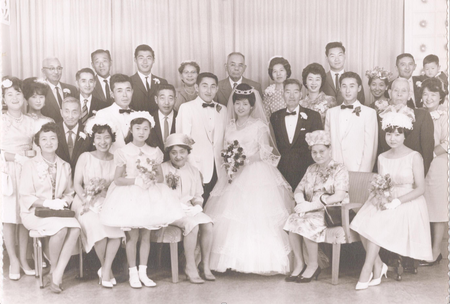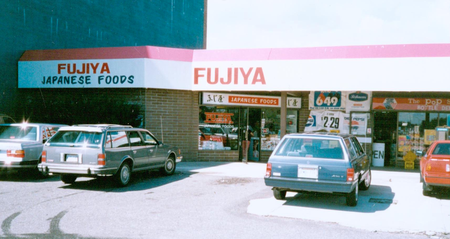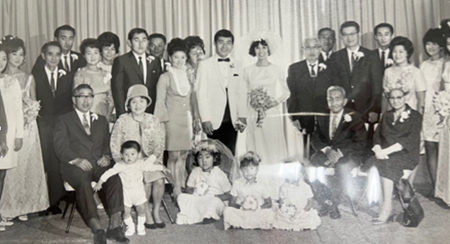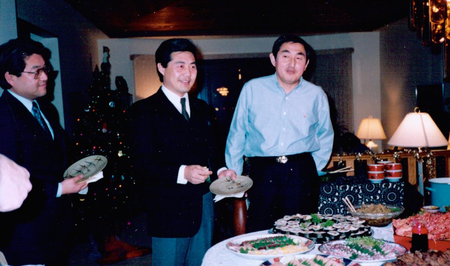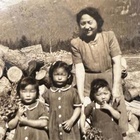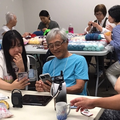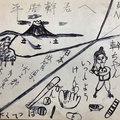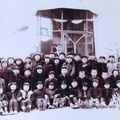In stark contrast to Shig, who had previously lived in Canada till age nine and spoke English as his first language, Miki could hardly speak any English at all. He had never learned English in Japan. He had learned romaji (Roman letters), but little more. However, he was naturally good at math and had also studied soroban in Japan, so math class was easy for him. He had done very well in school in Japan — one of the top three in his class out of about one hundred and fifty students.
This would not be the case in Canada. Although he had completed grade 5 in Japan, because of his lack of English he was placed in grade one at Taber. “I was the biggest guy in the classroom because all the other kids were five or six years younger. I was almost twelve then.”
Due to the language barrier, he was terrified to go to school, and recalls being especially afraid of what would happen if he missed the school bus back to home as there was no way to contact his family. He couldn’t speak English if he needed to ask for help.
However, his mother made him go to school anyway, and he remembers waiting for the school bus while holding his blue lunch box. He felt frustrated and bored with grade one level schoolwork, so he often just sat there. Fortunately, his classmates were kind and tried to help him with English, so he got along with them well. He also recalls a good teacher giving him extra help.
The farm had a big underground cement holding pool for water, which became their source of drinking water. A big truck would come and dump the water in it, and that was the water they used for living. After coming back to the farm from school each day, Miki’s job was to fill big jars with water from the holding pool and carry it to his family and others working in the fields.He also occasionally helped out with the smaller vegetable garden work.1
The family’s lack of a car made it impossible to go to town and join in team sports such as baseball or even socialize much with other kids. The only people he could talk with were his mother, brother, and uncle. As he puts it, “I was just cut off for a year and a half or so.”
The sugar beet work was extremely hard on his mother, Fujiye. Miki recalls that the sugar beets were often bigger than Japanese radishes (daikons). They had to pick them up and chop off the leafy part by hand. Then they gathered them up and took them to a sugar beet factory in Taber. It was a huge factory, and the sugar beets were piled up high beside it “like mountains.”
Return to Vancouver
In 1957, after a year and a half in Taber, Fujiye, Shig, and Miki moved back to Vancouver, and Hyoshiro came from Japan and joined them. After suffering a serious foot injury, Shig had stopped working at the sawmill and was now employed in a furniture factory in Vancouver, a job he continued until the factory burned down. He was also doing Japanese gardening. Fujiye soon found housekeeping work and a job in a chicken processing factory. Eventually she began barbering again.
Their friends the Kada family again let them live in their home. They had a small space in the basement with a little kitchen, living room, and one bedroom. Shig and Miki slept in the attic. They lived there for several years and grew up together with the two youngest Kada brothers. Miki used to go with one of the Kada brothers to Hastings Elementary School. He started in grade two but soon skipped to grade four, so was catching up.
However, because he had difficulty understanding English well, he was barely passing, in contrast with the excellent grades he had gotten in Japan. He was afraid to show his report card to mother and recalls just signing her name on it and returning it to his teacher. English was his worst subject, and this handicapped his ability to learn the other subjects as well. He had not learned to read enough Kanji characters to use a Japanese-English dictionary, and his parents also could not help him much due to their limited English.
Fortunately, in grade eleven he had a very good teacher who worked with him after school and helped him improve his English. As a result, his grades improved to a B average. He liked science and math but English was still very difficult. He persisted on through grade thirteen but heard that English was the hardest required university subject so decided not to go on to university.
Some time after returning to Vancouver, Fujiye started to work in a barbershop owned by some Chinese people. About a year or two later she decided to open her own shop (Fuji Barbers) on Main Street, where the police station is now located. She urged her son Shig to get his barbering license in order to have a practical trade to rely on, so he went to Moller School of Barbering and started working with her.
After Miki’s decision not to go on to university, she likewise convinced him to learn barbering, so he also went to barbering school and joined Fujiye and Shig in her barbershop. Later, the city demolished the building to make space for a new police station, so they moved the shop to a location on Dunlevy Street across from Powell Street.2 The new shop did well, and Miki recalls he and Shig learning a lot from their conversations with their various customers. Shig became especially popular among the Vancouver police and they would line up for his crew cuts.
On August 25, 1962, Shig married Akemi Eto, the sister of a good friend, Her dedicated support would become a major factor behind his future business success. Shig and Akemi would later go on to open a very successful Japanese restaurant called Maneki and then a Japanese grocery store which grew into the well-known Fujiya grocery chain with four branches in Vancouver and one in Victoria.
After returning from Japan and rejoining his family in Vancouver, Hyoshiro did various things to support the household and Fujiye’s barbershop business, becoming the “main cook” and cleaner at home. Shig remembers often being sent by his father to buy groceries.
After Shig and Akemi married, Hyoshiro and Fujiye moved in with them. Akemi recalls, “Father did all the gardening around the house. The peony flowers and climbing roses around the fence were beautiful.” He also enjoyed watching horseracing and going bowling every week and was a member of the Japanese Kika bowling team.3
Miki went on to start his own barbershop. On September 6, 1969, he married Miyako Kawazoe, who had been born and raised in Osaka and had immigrated to Canada alone as a young single woman in September, 1968.
The first time Miyako and Miki met each other was at a Christmas Eve party. Some of her friends in Vancouver at that time were barbers and hairdressers who had immigrated earlier. Miki was established as a barber then and would explain to newly arrived barbers how to get a license in Canada, so had gotten to know quite a lot of them. Some of these barbers invited him to a Christmas party where he met Miyako.
They happened to meet again two or three days later when she was shopping for Japanese food with some friends and their romance began. Eventually he moved on to various start-up ventures and had a career in fish wholesaling, international marketing, and consulting. He established a company called Sunny Marketing.
The next chapter will be about Miki’s life after retirement and activities in the Japanese Canadian community in Vancouver.
Notes:
1. Ibid.
2. The building in which the shop was located is still standing.
3. Hyoshiro Hirai Passed away on November 5, 1981 at the age of 74. Fujiye Hirai passed away on March 10, 2005 at the age of 94.
© 2024 Stanley Kirk


